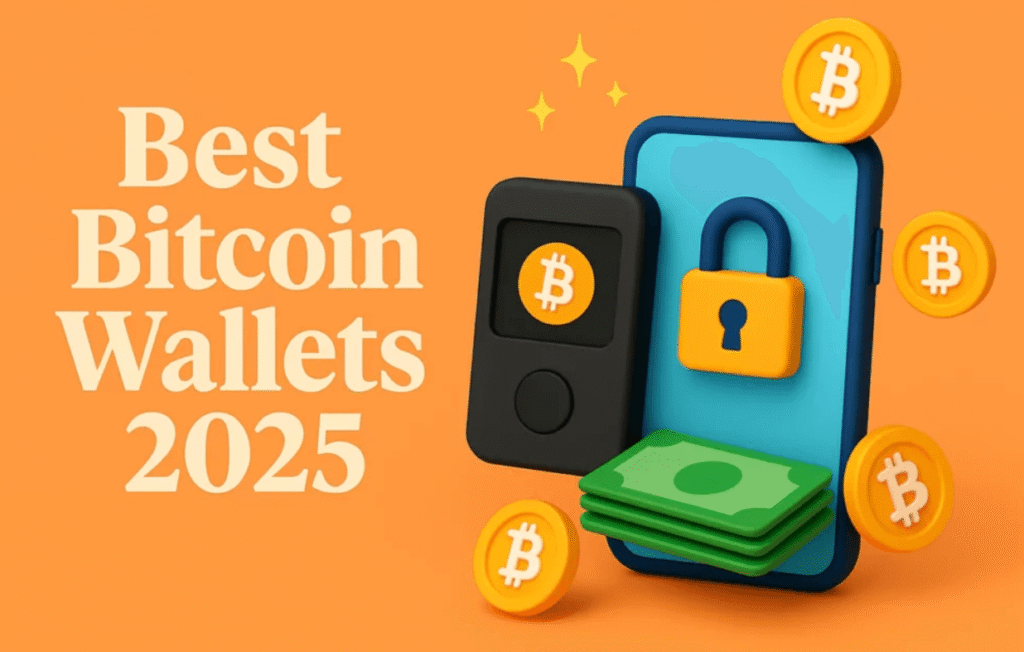As the cryptocurrency market continues its global expansion, ensuring the security of your digital assets has never been more crucial. With millions of users adopting Bitcoin, Ethereum, and other altcoins, malicious actors are becoming more sophisticated. Choosing the right crypto wallet in 2025 can mean the difference between safe investments and devastating losses.
The rise in blockchain adoption, decentralized finance (DeFi), and non-fungible tokens (NFTs) means individuals are no longer relying on centralized exchanges for custody. Instead, they turn to crypto wallets that provide control, security, and autonomy over their assets. In this article, we explore the top 5 crypto wallets in 2025 that are redefining digital asset safety.
Features to Look for in a Secure Crypto Wallet
When selecting a cryptocurrency wallet, especially in 2025 where threats are evolving rapidly, security should be your top priority. However, usability, compatibility, and features also play major roles in the overall user experience.
Here’s what to consider before choosing your crypto wallet:
- Security Protocols
- Ensure the wallet offers end-to-end encryption, two-factor authentication (2FA), and biometric security.
- Hardware wallets should feature air-gapped technology and PIN-based access.
- Ensure the wallet offers end-to-end encryption, two-factor authentication (2FA), and biometric security.
- Private Key Ownership
- The wallet must give full control of your private keys—if you don’t control your keys, you don’t control your coins.
- The wallet must give full control of your private keys—if you don’t control your keys, you don’t control your coins.
- Supported Assets
- In 2025, there are over 20,000 active cryptocurrencies. Choose a wallet that supports a wide range of tokens and coins, including ERC-20, BEP-20, and NFTs.
- In 2025, there are over 20,000 active cryptocurrencies. Choose a wallet that supports a wide range of tokens and coins, including ERC-20, BEP-20, and NFTs.
- User Interface & Accessibility
- A complex UI can lead to user errors. Go for wallets that are intuitive and available across desktop, mobile, and browser extensions.
- A complex UI can lead to user errors. Go for wallets that are intuitive and available across desktop, mobile, and browser extensions.
Overview of the Top 5 Crypto Wallets in 2025 (Comparison Table)
| Wallet Name | Type | Supported Assets | Key Security Feature | Ideal For |
| Ledger Nano X | Hardware | 5,500+ | Secure Element chip (CC EAL5+) | Long-term holders |
| Trezor Model T | Hardware | 1,800+ | PIN & passphrase protection | Advanced users |
| MetaMask | Software | ETH, ERC-20, NFTs | Private key control | DeFi & NFT traders |
| Trust Wallet | Mobile App | 10,000+ | Biometric + 12-word recovery | Beginners & investors |
| Coinbase Wallet | Software | BTC, ETH, 100+ | Encrypted key storage | Coinbase ecosystem users |
Detailed Review of the Top 5 Crypto Wallets in 2025
Security, functionality, and ease of use vary widely among crypto wallets. Below, we dive deeper into the top five wallets dominating the crypto landscape in 2025.
1. Ledger Nano X
- Type: Hardware Wallet
- Strengths: Air-gapped device, Bluetooth support, secure chip
- Ledger Nano X continues to be a favorite among serious investors. It offers offline cold storage, meaning your assets are kept away from internet exposure. Its Bluetooth capability allows mobile access without sacrificing security. With support for over 5,500 coins, it’s ideal for diversified portfolios.
2. Trezor Model T
- Type: Hardware Wallet
- Strengths: Open-source firmware, touchscreen interface
- Known for transparency and reliability, the Trezor Model T uses FIDO2 authentication, password manager, and supports Shamir Backup. It supports a wide variety of coins, and its intuitive touchscreen makes navigation simple.
3. MetaMask
- Type: Software Wallet (Browser & Mobile)
- Strengths: Seamless Web3 integration, popular among DeFi users
- MetaMask is the go-to wallet for Ethereum-based tokens, NFT collectors, and DeFi traders. Integrated with browsers and mobile apps, MetaMask allows for easy interaction with smart contracts and decentralized applications (dApps). Remember to enable hardware wallet compatibility for added protection.
4. Trust Wallet
- Type: Mobile Wallet
- Strengths: Wide support for tokens, staking, and NFT management
- Backed by Binance, Trust Wallet offers multi-chain compatibility and allows users to stake coins and earn passive income. It’s user-friendly, making it a top pick for newcomers. The in-app swap feature also supports DeFi trading on-the-go.
5. Coinbase Wallet
- Type: Software Wallet
- Strengths: Great for beginners, linked to Coinbase exchange
- Unlike the custodial Coinbase platform, Coinbase Wallet gives full control of keys. It supports dApps, NFTs, and DeFi protocols. For users who began on Coinbase but want more control, this is the ideal stepping stone.
🛡️ Pro Tip: Always pair software wallets with a hardware wallet for large holdings. Never store significant funds in exchange wallets alone.
Hot Wallets vs Cold Wallets – What’s the Difference?
Understanding wallet types is essential for proper asset protection. Crypto wallets generally fall into two categories: hot and cold wallets.
Hot Wallets:
- Connected to the internet
- Include mobile, desktop, and browser wallets
- Offer convenience and real-time access
- Examples: MetaMask, Trust Wallet, Coinbase Wallet
Cold Wallets:
- Offline storage method
- Immune to online hacks or phishing
- Best for storing large amounts or long-term holdings
- Examples: Ledger Nano X, Trezor Model T
🧊 Cold wallets are considered the most secure way to store crypto assets long-term.
H6: Tips to Keep Your Crypto Wallets Safe in 2025
Even with the best wallet, security is only as strong as your personal habits. Here’s how to safeguard your crypto in 2025:
- Use Hardware Wallets for Large Sums: Keep the majority of your assets offline.
- Enable 2FA & Biometrics: Especially for mobile and browser wallets.
- Back Up Your Seed Phrase Securely: Write it down and store it in a fireproof safe. Never save it digitally.
- Avoid Phishing Links: Double-check URLs before connecting your wallet.
- Keep Software Up to Date: Install wallet updates to patch vulnerabilities.
⚠️ Never share your private key or seed phrase. No legitimate company will ever ask for it.
FAQ: Which Crypto Wallet Is Best for Beginners?
FAQ 1: What is the safest and easiest crypto wallet to start with?
| Feature | Trust Wallet | Coinbase Wallet |
| Ease of Use | ✅ Beginner-friendly UI | ✅ Seamless Coinbase link |
| Private Key Access | ✅ Yes | ✅ Yes |
| Multichain Support | ✅ 10,000+ coins | ✅ Limited |
| NFT Support | ✅ Yes | ✅ Yes |
| In-App Staking | ✅ Yes | ❌ No |
For beginners, Trust Wallet is highly recommended due to its simple interface, staking features, and broad coin support. Coinbase Wallet is ideal for those already within the Coinbase ecosystem looking to transition to self-custody.
Final Thoughts
In 2025, cryptocurrency adoption is booming, and so are the risks associated with digital asset management. With security breaches and scams on the rise, selecting a trustworthy and feature-rich crypto wallet is essential for both new and seasoned investors.
The top 5 wallets we’ve covered—Ledger Nano X, Trezor Model T, MetaMask, Trust Wallet, and Coinbase Wallet—offer a range of options to suit every user’s needs, from institutional-grade cold storage to on-the-go DeFi interaction.🛡️ Don’t just invest in coins—invest in security. Your financial future depends on it.







